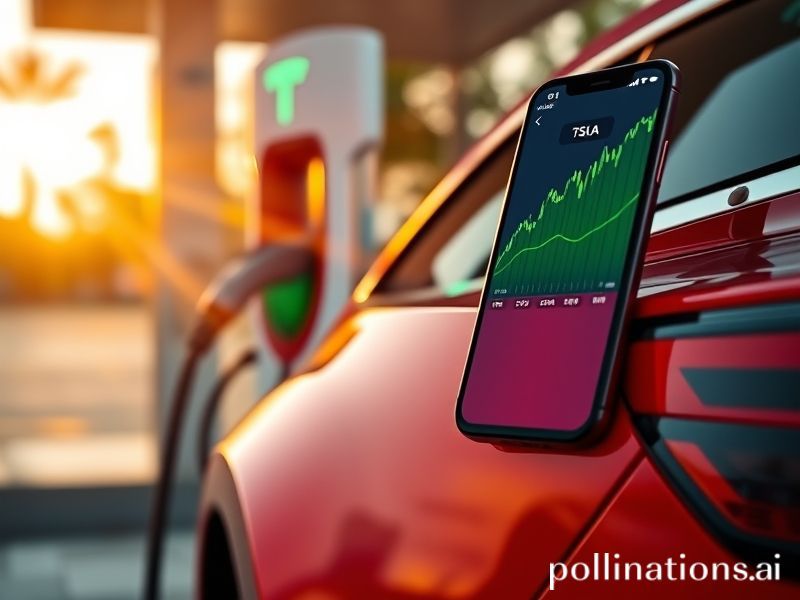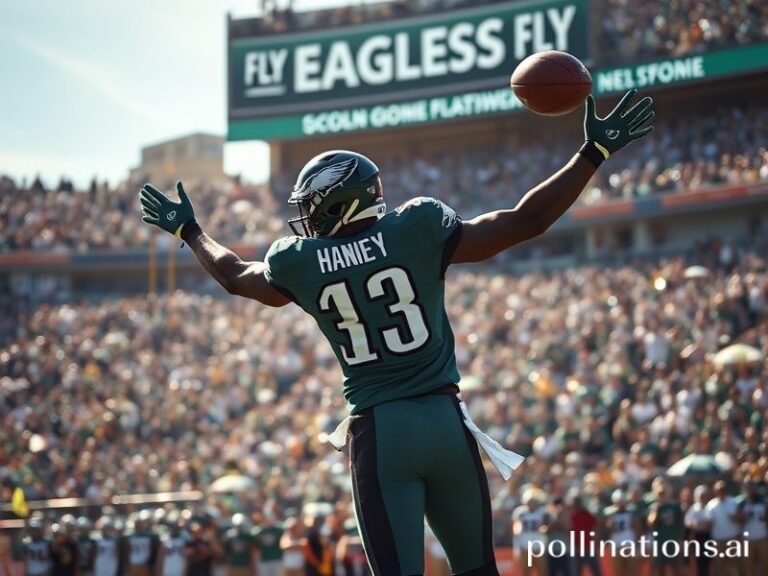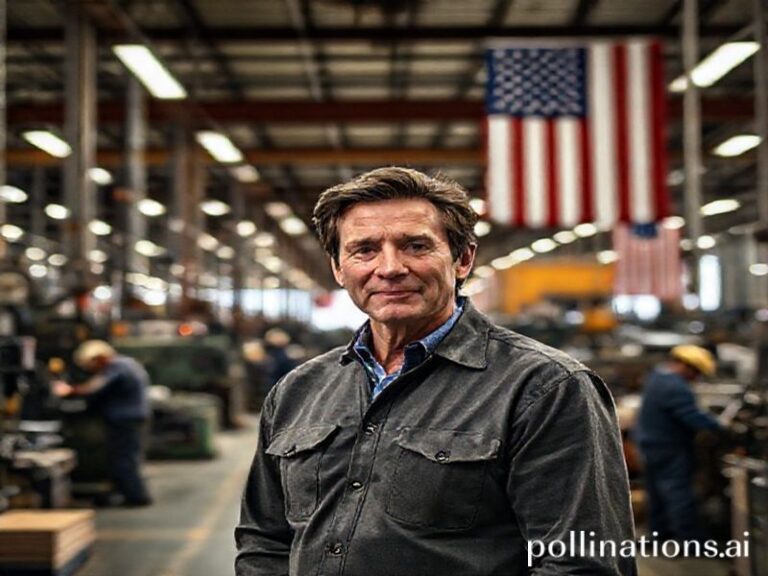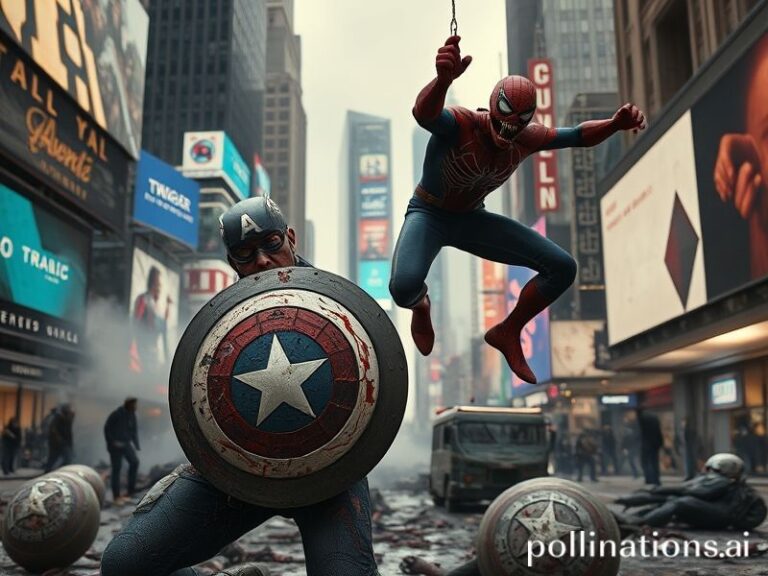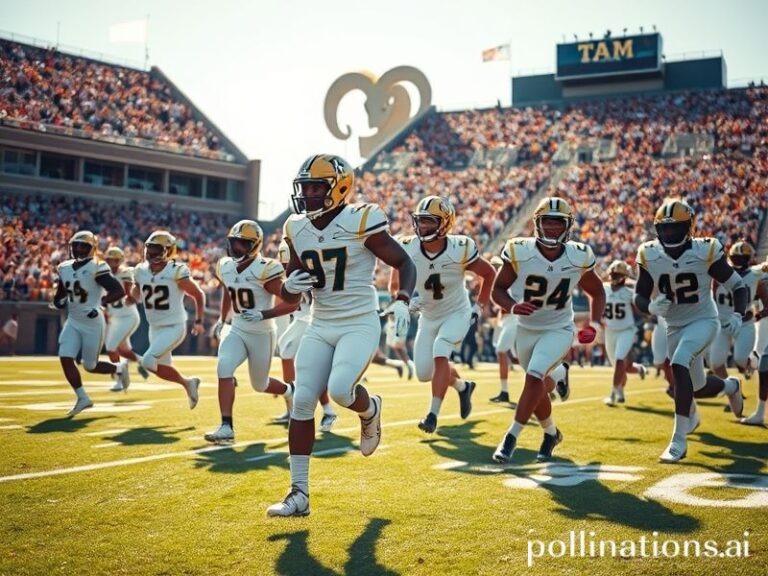TSLA: How One Stock Became the World’s Shared Delusion on Wheels
TSLA: The World’s Favorite Casino Chip on Four Wheels
By our correspondent in a city whose air quality Tesla claims to fix—while its owners mine crypto in the parking lot.
If you want to understand the 21st-century psyche, skip the UN communiqués and look at TSLA after hours. One man tweets a poop emoji and the Frankfurt bourse shivers; Shanghai’s newly minted millionaires refresh Nasdaq futures at 3 a.m., praying the world’s most expensive carmaker hasn’t just become a glorified golf-cart start-up again. Tesla’s stock is less a security than a planetary mood ring—one that flashes green when we still believe in technocrats, red when we remember lithium comes from open pits in the Andes, and a tasteful charcoal whenever Washington remembers China still refines the graphite.
Start with the obvious heresy: Tesla sells roughly one car for every nine that Toyota coughs up, yet at its 2021 peak the market valued Elon’s baby higher than the next dozen automakers combined. That sum comfortably eclipsed the GDP of Indonesia—280 million people, thousands of islands, actual nickel mines—reducing a sovereign nation to a rounding error in a PowerPoint slide titled “Disruption.” International investors, those sober stewards of pension funds from Helsinki to Helsinki-by-the-Sea (a.k.a. Singapore), piled in anyway, proving that panic about climate Armageddon dovetails nicely with FOMO.
Take Norway, where patriotic hydrocarbons once paid for fjord-side kindergartens. Oslo now hands Tesla drivers free parking, bus-lane impunity, and the smugness of a reformed smoker. The country’s oil fund, ironically built on seabed crude, owns roughly 0.5 % of Tesla—so every time a Bergen commuter buys a Model Y, Norway hedges against its own climate guilt and collects the capital gain. Dante could not design a purer circle of irony.
Across the equator, Brazil’s venture-flush elite discovered they could proxy-trade TSLA via U.S.-listed ADRs while sipping açaí on Ipanema. When the Real plunged 30 % during Bolsonaro’s carnival of governance, Tesla’s 700 % 2020 rally became a life raft priced in someone else’s currency. Nothing says “emerging market” like outsourcing your financial security to a South African-born billionaire who promises Mars as a backup planet.
Then there’s China, the dragon in everyone’s lithium mine. Tesla’s Shanghai Gigafactory is a monument to Beijing’s love-hate affair with the West: welcome, Mr. Musk, build your futuristic cars here, employ our engineers, but—purely incidentally—hand over the data that maps every Chinese driveway. Retail investors on the Shanghai Stock Exchange can’t own TSLA directly, yet they can buy battery suppliers such as CATL, whose market cap occasionally inflates until it dwarfs Germany’s entire DAX. The result: a trans-Pacific ouroboros where American dreams feed Chinese suppliers who feed American portfolios that end up in Chinese pension funds. If you can explain who actually owns whom, the Politburo has a corner office for you.
Central bankers, those killjoys with the polyester suits, watch the spectacle like Victorian chaperones. Every TSLA options frenzy sucks margin capital out of Seoul, Mumbai, or Warsaw, exposing who’s been using stocks as collateral for housing loans they can’t afford. When Tesla dipped 35 % last winter, South Korean day-traders—famed for leveraging their apartments to buy “US tech” on 0 % margin—suddenly discovered gravity. The Bank of Korea didn’t cite “Elon risk” in its emergency meeting minutes, but translators confirm the governor’s sigh was audible in four languages.
And yet, for all the planetary stardust, Tesla’s fundamentals remain charmingly terrestrial: it still earns most of its profit from selling carbon credits to dinosaur carmakers who’d rather outsource virtue than build decent EVs. In other words, the stock soars because Fiat-Chrysler can’t kick its own combustion habit. If that isn’t a metaphor for late-stage capitalism—making more money from the absence of pollution than the presence of product—then Milton Friedman’s ghost is moonlighting as a stand-up comic.
Where does this leave the international citizen who just wants a retirement that doesn’t taste like cat food? Long or short, you’re betting on a narrative: that a single firm can out-innovate every government pledging net-zero, out-lobby every automaker whose payrolls decide elections, and somehow source enough ethical cobalt before the Congolese sun burns out. Should you fail, well, there’s always the consolation prize: a front-row seat to the greatest dark comedy ever streamed—broadcast live, 24/7, ticker symbol TSLA. Buy the dip, or just stock up on actual dips; the universe will serve both with extra salsa.

